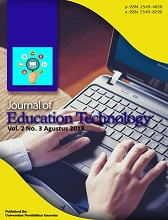The Implementation of Outcome Based Education to Support Student Understanding and Performance in the Internet of Things Course
DOI:
https://doi.org/10.23887/jet.v8i3.76329Keywords:
Internet of Things (IoT), technology applications, Civil Engineering, OBE implementation, student participationAbstract
Outcome Based Education (OBE) is a learning method that focuses on outcomes in a learning process. In the field of engineering, the delivery of lecture materials coupled with the achievement of targets for outcomes is a challenge, especially when it comes to technology applications. This is because the application of technology requires real examples, so that the students can have a comprehensive picture and understanding. This study was carried out on the Internet of Things (IoT) course at Undergraduate Program in Civil Engineering, Faculty of Engineering. This course discusses the basics of applying IPTEKS (Science, Technology and Arts) tools that can be utilized in the field of Civil Engineering, especially in the current Industrial Revolution 4.0. This research was intended to evaluate the OBE implementation, in terms of student participation and level of understanding of students. Observations were made during one semester by observing the results of student evaluations and the feedback received by the lecturers. The evaluation was carried out qualitatively and quantitatively based on the course learning outcomes (CLO). The results showed that all students actively participate in the learning process using this OBE method. The high level of material understanding was indicated by the achievement of a 100% passing rate, but there were still two students who have not fulfilled two CLOs. Therefore, continuous improvement efforts are still needed in implementing OBE for students, so that all students can fulfill all CLOs in Internet of Things courses.
Published
How to Cite
Issue
Section
License
Copyright (c) 2024 Undayani Sari, Bagus Setiadji, Amelia Indriastuti, Banu Hidayat, Danang Admojo

This work is licensed under a Creative Commons Attribution-ShareAlike 4.0 International License.
Authors who publish with the Journal of Education Technology agree to the following terms:
- Authors retain copyright and grant the journal the right of first publication with the work simultaneously licensed under a Creative Commons Attribution License (CC BY-SA 4.0) that allows others to share the work with an acknowledgment of the work's authorship and initial publication in this journal.
- Authors are able to enter into separate, additional contractual arrangements for the non-exclusive distribution of the journal's published version of the work (e.g., post it to an institutional repository or publish it in a book), with an acknowledgment of its initial publication in this journal.
- Authors are permitted and encouraged to post their work online (e.g., in institutional repositories or on their website) prior to and during the submission process, as it can lead to productive exchanges, as well as earlier and greater citation of published work. (See The Effect of Open Access)

















